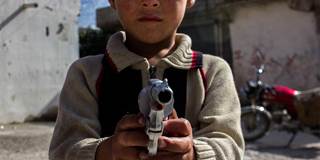Given the scale of the threat posed by the Islamic State to Iraq and the Middle East, focusing on the implications of US policy is understandable. But whether the current crisis will have a happy ending – or even a tolerable one – depends far more on what the region’s players decide to do.
DENVER – President Barack Obama’s decision to increase the number of American troops on the ground in Iraq, and to base them in Sunni-dominated Anbar province, has sparked wide discussion. In the United States, the public debate has turned to the lessons of Vietnam, where incremental deployments led to a quagmire. But in the Arab world, the discussion is about the political ramifications of the decision: Has the US, by arming Sunni militias, abandoned hope for a unitary Iraq?
Given the scale of the threat posed by the Islamic State to Iraq and the Middle East, and its emergence at a time when the marathon 2016 US presidential election campaign is getting underway, the attention devoted to the implications of American policy is understandable. But whether the current crisis will have a happy ending – or even a tolerable one – depends far more on what the region’s players decide to do.
Since the crisis began, much has been made of whether Iraq’s Shia leaders – particularly former Prime Minister Nouri al-Maliki and his successor, Haider al-Abadi – have done enough to reach out to the country’s Sunni minority. Though Sunnis account for only around 20% of Iraq’s population, they play an outsized role in determining the country’s fate. They have been a key element of Mesopotamia’s ruling classes for centuries, and their sense of entitlement is palpable. Moreover, aside from Syria, Sunnis rule every Arab state, including where they are a minority (as in Bahrain).

DENVER – President Barack Obama’s decision to increase the number of American troops on the ground in Iraq, and to base them in Sunni-dominated Anbar province, has sparked wide discussion. In the United States, the public debate has turned to the lessons of Vietnam, where incremental deployments led to a quagmire. But in the Arab world, the discussion is about the political ramifications of the decision: Has the US, by arming Sunni militias, abandoned hope for a unitary Iraq?
Given the scale of the threat posed by the Islamic State to Iraq and the Middle East, and its emergence at a time when the marathon 2016 US presidential election campaign is getting underway, the attention devoted to the implications of American policy is understandable. But whether the current crisis will have a happy ending – or even a tolerable one – depends far more on what the region’s players decide to do.
Since the crisis began, much has been made of whether Iraq’s Shia leaders – particularly former Prime Minister Nouri al-Maliki and his successor, Haider al-Abadi – have done enough to reach out to the country’s Sunni minority. Though Sunnis account for only around 20% of Iraq’s population, they play an outsized role in determining the country’s fate. They have been a key element of Mesopotamia’s ruling classes for centuries, and their sense of entitlement is palpable. Moreover, aside from Syria, Sunnis rule every Arab state, including where they are a minority (as in Bahrain).